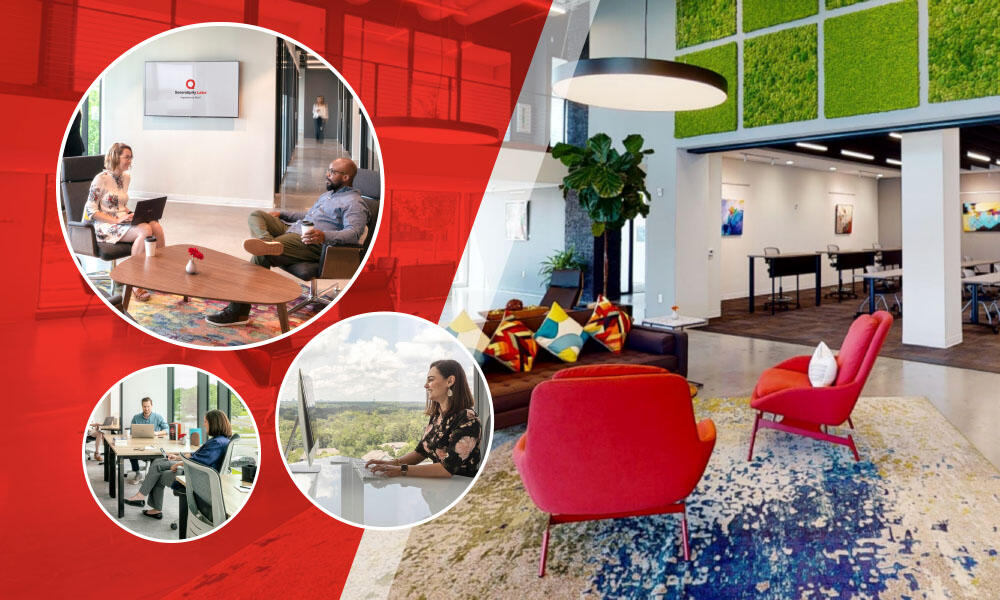To Compete with WFH, Office Landlords Deliver the Workplace of the Future

2021 has seen no shortage of studies, surveys, and speculation surrounding the future of the workplace and of commercial office assets. While many businesses have begun exploring the benefits of hybrid or work-from-anywhere models, asset owners are already taking steps to offer innovative workspaces to address office tenant demand for a more flexible future. Among the considerations are tenants’ desires for more spacious and collaborative office layouts, a shift toward offering workplace options closer to where employees live, and a significantly greater focus being placed on introducing workplace offerings with shorter contracts and the ability to support flexible, distributed workplace policies.
Shifting Priorities and a Flight to the Suburbs
Early in the pandemic, most American knowledge workers shifted to working from home (WFH), adopting collaboration tools and eliminating city center commutes. According to a 2021 University of Chicago Study, 60% of remote workers reported higher levels of personal productivity and a marked improvement in their quality of life. Without need for daily visits to a central headquarters office, many set out for the suburbs or relocated to smaller cities.
Initially, suburban and secondary market office asset owners expected to capture the new distributed workforce demand with traditional leases as companies considered hub and spoke location strategies to offer workplaces closer to home. However, the suburban office leasing boon has not materialized, with companies instead seeking to support their distributed workplace strategies with more flexible, shorter term workplace arrangements than traditional leases. With 3Q21 suburban U.S. office vacancy rate in the 20-25% range, and most suburban tenant requirements being for fewer than 50 people, there is pressure for office landlords to offer shorter leases, higher service levels and more flexibility to win market share.
Serendipity Labs, a leading brand in coworking and flexible office spaces, licenses, opens and operates its upscale workplace brand for landlords in a turnkey arrangement that includes central sales and marketing, an industry-leading technology platform, and decades of experience of its management team.
“Our national footprint of locations is served by central sales, including strategic sales partners, our own national account sales team and a 360-degree marketing platform,” said John Arenas, Chief Executive Officer at Serendipity Labs. “If you’re a landlord with access to those resources you can generate higher credit quality revenue,” he added. The resources Arenas cites allow Serendipity Labs to generate 80 percent of the revenue in a location centrally. Further, the brand is a preferred flex office provider with real estate service firms CBRE, JLL, Cushman & Wakefield and others. Serendipity Labs also has access to a global supply chain that allows the company to procure lighting, furniture, and architectural wall systems made to their specifications, which lowers overall capital requirements.
Paul Ciminelli, president and CEO of Ciminelli Real Estate Corporation, a full-service real estate firm with a portfolio spanning the eastern U.S, has experienced these benefits firsthand. “We selected Serendipity Labs as an amenity for our buildings and opened the first one in Buffalo this winter. The market has been impressed with the Serendipity Labs workplace design and service level, and our strong membership numbers reflect it.”
A Head Start in the Field
Although flexible coworking spaces are more popular now than ever before, Serendipity Labs distinguishes itself from other similar companies due to its longstanding history of delivering an upscale, hospitality-based workplace experience that serves as an extension for businesses and a home base for established and independent professionals. Since it was founded in 2011, Serendipity Labs has grown to include over 30 locations, allowing users to tap into this extensive network of locations across suburban and secondary cities. This flexibility includes the freedom to choose from a wide variety of private offices, customizable team suites, meeting rooms and other collaboration and event spaces.
With an executive team having over 25 years of experience in building and operating national flexible office brands, Serendipity Labs realized the importance of flexible coworking spaces well ahead of today’s more urgent demand. It further differentiates itself by offering welcoming and productive environments that meet the on-demand workplace needs of remote and mobile workers, business travelers and project teams. The company’s drop-in work lounges, cafes, and meeting facilities support escaping the home office or avoiding a commute as needed.
“As companies outsource their real estate strategy, we believe that by creating a network of inspirational, safe and welcoming workplaces we are bringing office real estate into the future,” Arenas explained in an interview with The Real Deal. “Our decision to deliver the workplace as an experience designed for those who could choose where and when to work has been rewarded with strong demand from trusted knowledge workers and their employers who now seek to support flexible work.”
The Future
Going forward, Serendipity Labs is capitalizing on its U.S. momentum by continuing to expand in the U.S. and United Kingdom. The Serendipity Labs team also plans to continue providing its services in the suburbs and secondary markets. As the nation continues to emerge from the pandemic and the future of commercial workspaces becomes better defined, working close to home, but not at home, can bridge the gap between home and the traditional workplace.

